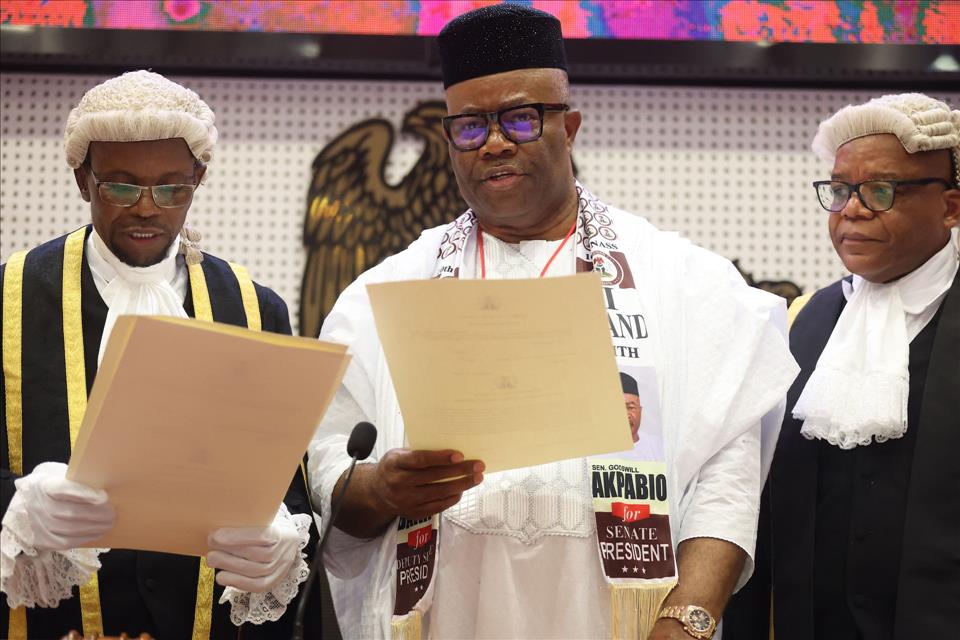(MENAFN- The Conversation) Nigeria's national assembly – the 10th since independence – was inaugurated on 13 June 2023. It has two arms: the Senate and the House of Representatives. The 109 senators and 360 representatives were elected on 25 February 2023. Godswill Akpabio was elected Senate president and Tajudeen Abass House of Representatives speaker.
Its primary responsibility is lawmaking for effective administration of the state. In Nigeria, the power of the National Assembly's two houses to legislate is enshrined in section 4 of the 1999 constitution .
The constitution also enables the National Assembly to scrutinise and monitor executive activities. sections 88 and 89 of the constitution set out its the oversight powers.
Overseeing the executive requires a determined and strong legislative institution committed to its constitutional responsibilities.
As a researcher with expertise in legislative studies and a published paper on legislative oversight in Nigeria, I think for the 10th Assembly to succeed in discharging its constitutional responsibilities, it should focus on four critical issues.
Issues deserving attention
I think the National Assembly should focus on the following issues for the next four years: the economy; power supply; infrastructure; and security.
The economy
First, the national economic situation is worsening. Nigeria is grappling with inflation and extreme poverty . The recent removal of the fuel subsidy will make it harder for people to make a living and survive. Thus, a legislative agenda to redeem the national economy is imperative..
Read more: nigeria's economy: four priorities president-elect bola tinubu must deliver on
.
Power supply
Second, meaningful economic policies and programmes require a regular power supply. Since 1999, an estimated n11 trillion (about US$14 billion) has reportedly been committed by successive governments to electricity supply. Yet power is still unreliable. Manufacturers, artisans and citizens depend on alernative sources that generate 75% of their electricity needs. On top of this, a 40% electricity tariff hike is due to take off on 1 July. Some manufacturers have threatened to leave Nigeria if this goes ahead. This will add to the unemployment crisis projected to be 40.6% in 2023 and worsen the nation's economic conundrum. A legislative agenda that would address the power sector is imperative to halt the drift.
Infrastructure
The third legislative agenda item should be the country's infrastructural decay, especially the road networks. Nigeria has 195,000 km of road network of which about 60,000km are paved as at 2019. While the immediate past government constructed or rehabilitated 8,352.9km of roads , much still ought to be done in this area.
Transportation is central to sustainable economic progress and development. The National Assembly should rededicate itself to the scrutiny of the country's transport sector for an effective supply chain. Lower transport costs will make goods and services more affordable. Infrastructural decay and neglect have contributed to the crisis of governance in Nigeria.
Security
The fourth agenda item should be security. Nigeria is in crisis, experiencing different kinds of violence. The government is quick to deploy state machinery to suppress and repress direct and cultural violence, such as #endsars , insurgencies, kidnapping, armed robbery and separatist movements. But it has failed to address the most lethal: structural violence, which is the result of failed and failing institutional structures of the state.
One scholar has described structural violence as“a form of violence wherein social structures or social institutions harm people by preventing them from meeting their basic needs.”
At the centre of the country's structural violence is the burgeoning corruption and mismanagement of the nation's resources. Nigeria is currently ranked 150 out of 180 countries in the Corruption Perceptions Index by Transparency International. This has eroded the integrity of public institutions and leadership, including the National Assembly. The legislature has a role to play in this direction in reducing violence and improve security through constructive public engagement and transparent accountability. A purposeful monitoring and scrutiny of the implementation of the various economic policies, as the constitution demands, would reduce the scourge of corruption and mismanagement of appropriated resources and guarantee effective public service delivery. There is a need to restore public confidence in government.
Read more: nigeria's security situation has got worse: what tinubu's administration needs to do about it
.
The way forward
All the issues are within the oversight competence of the National Assembly. Effective oversight of executive actions is a necessity to boost the fortunes of the nation and rekindle the hope of citizens that entrusted the National Assembly with their collective power for the promotion of their interests.
Since the Fourth Republic began on 29 May 1999, Nigerians have been waiting in vain for the assembly to fulfil this role. The previous nine legislatures have failed as the central institution of the government. That's because politics has been about personal power and financial gain.
Under President Olusegun Obasanjo's government from 1999 to 2007 , the National Assembly was unable to assert its relevance. The executive sought to cage and control its activities, against the principle of separation of powers. The corruption scandals in the legislature since 1999 have dented the assembly's integrity as the conscience of the public.
The failure of the legislative assemblies since 1999 to do what the constitution expects of them has resulted in the country's people being unable to meet their basic needs.
When other institutions of the government fail in their responsibilities, the legislature cannot afford to fail its principal, the people. Nigeria's 10th Assembly can make a difference.




















Comments
No comment